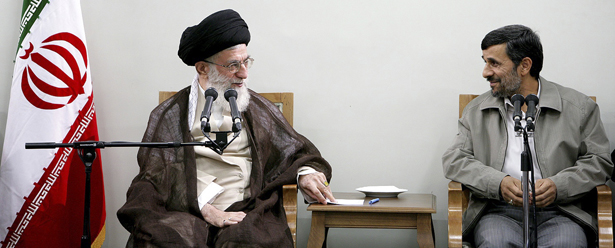It's Not Too Late to Peacefully Keep Iran From a Bomb
A new report by the UN nuclear watchdog shows that diplomacy, if done right, could deter Iran from developing a nuclear weapons program

Iranian supreme leader Ayatollah Ali Khamenei and President Mahmoud Ahmadinejad / Reuters
The hype surrounding the release of the International Atomic Energy Agency's report on Iran's nuclear program was almost on par with the hysteria around the release of Apple's iPhone 4S. The report by the UN agency did flesh out some details on Iran's efforts to obtain atomic weapon capability. But the keenly awaited document, much like the iPhone 4S, failed to surprise. Still, this is important in itself: it means there is still time to roll back any Iranian nuclear weaponization efforts without resorting to anything too drastic.
The report was published as major powers split over the Iranian nuclear issue. While the United States, France, and Britain pressure the IAEA to bare more details on Iran's alleged nuclear arms experiments, Russia and China admonish "groundless haste" and warn against cornering Iran.
The IAEA released their report at a very sensitive time, with tensions between Washington and Tehran at record high over the alleged Iranian plot to assassinate the Saudi ambassador in Washington. Some U.S. and Israeli leaders have responded with bellicose rhetoric about a possible preemptive strike on Iran, and Israel has test-fired ballistic, nuclear-capable missiles. All together, this has made something of a pre-release scare campaign for the report's findings.
Yukiya Amano, Director General of the IAEA, appears to have tried to strike a balance in the report between absolute imperatives of objectivity and pragmatic concerns of nonproliferation. While the agency clearly explains how Iran has violated its nonproliferation obligations by covertly developing toward a nuclear explosive device, it carefully notes where the evidence is thin and points out the absence of a smoking gun. Nonetheless, Ali Asghar Soltanieh, Iran's ambassador to the IAEA, described the new report as "unbalanced, unprofessional and politically motivated." Washington was swift to threaten Iranian leaders with imposing more sanctions "if they are unable to answer the questions that are raised by this report." Moscow, however, fulminated against publication of the report, which they believe dims prospects for productive dialogue with Tehran.
By lifting Iran's veil of nuclear secrecy a bit, the UN nuclear watchdog has informed the wider public of the scale and severity of the country's nuclear pursuits. That Iran would like the know-how and capability to manufacture a nuclear device is not startling to nonproliferation and intelligence experts. The majority of the information in the report is actually comes from previous IAEA publications, and thus is not new. Both the 2007 U.S. National Intelligence Estimate and the 2009 IAEA report stated, "Iran has the scientific, technical and industrial capacity eventually to produce nuclear weapons, if it decides to do so."
Many Iran-watchers expected the report's biggest news to be evidence that elements of a nuclear program were not shut down in 2003, as previous U.S. intelligence reports claimed. But the report only described dispersed activities, mostly related to dual-use technologies. The scale and scope of these experiments appear much smaller than Iran's pre-2003 program, which was better structured and more vigorously pursued.
The one big thing this report tells us is that there is still time to resolve the Iranian nuclear crisis. Targeted sanctions and export controls have succeeded in seriously hampering Iran's uranium enrichment activities, as their centrifuges continue to underperform. After a decade of Iran's program waxing and waning, and under rigorous surveillance by the intelligence services of at least ten countries, Iran's goal of securing the ultimate weapon remains as elusive as ever. Most importantly, all evidence suggests that the decision to make a nuclear weapon has not yet been made.
Incriminating Tehran as a nuclear scofflaw has not succeeded in stopping its violations. Instead of recycling the failed policies of the past, the United States could lever this new report to unite the international community in demanding Iranian cooperation with the IAEA. The U.S. might take a page from the European playbook and use heightened tensions to engage Iranians in diplomatic negotiations and to elicit greater transparency.
During an unprecedented trip to Tehran in 2003, the foreign ministers of France, Germany, and the United Kingdom used international ire over revelations of Iran's long history of nuclear concealment as leverage to convince their Iranian counterparts to admit to their country's past wrongdoings. Just two days after the Tehran agreement was reached, the Iranian government fully disclosed its past undeclared activities to the IAEA, including valuable information about the relations with the illicit network of Pakistani nuclear scientist A.Q. Khan.
Why not try to reproduce such diplomacy-driven successes? If Iran is provided with guarantees that it will not be penalized for admitting to its past transgressions, it might be more willing to open up to greater IAEA scrutiny, which could help the world understand what threats it is and is not facing from Iran. A similar approach worked well in Libya and could work in Iran as well.
Given the short-term ineffectiveness of punitive measures and long-term consequences of military action, diplomacy remains the most viable means in resolving the Iranian nuclear impasse. This new report provides a good opening and a valuable bargaining chip, should major powers decide to use it.
Ali Vaez is the director of the Iran project at the International Crisis Group.